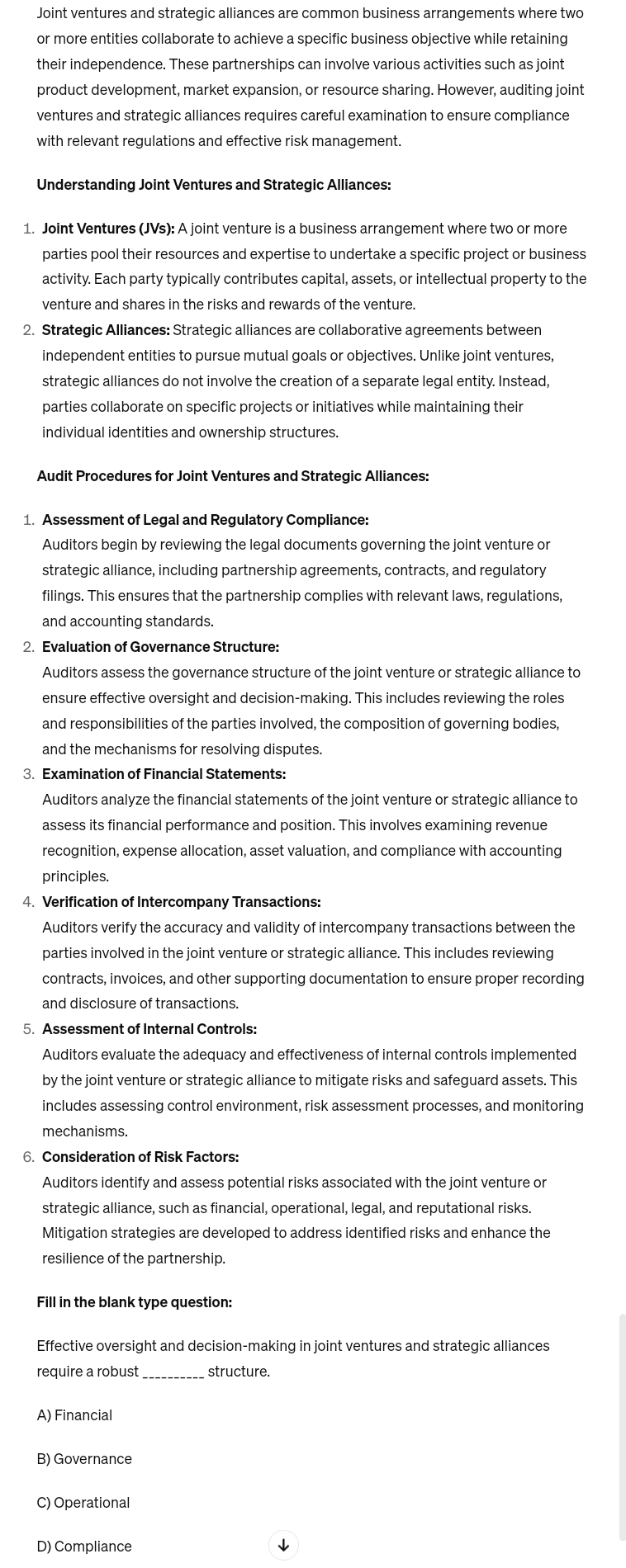Answered step by step
Verified Expert Solution
Question
1 Approved Answer
Joint ventures and strategic alliances are common business arrangements where two or more entities collaborate to achieve a specific business objective while retaining their independence.
Joint ventures and strategic alliances are common business arrangements where two or more entities collaborate to achieve a specific business objective while retaining their independence. These partnerships can involve various activities such as joint product development, market expansion, or resource sharing. However, auditing joint ventures and strategic alliances requires careful examination to ensure compliance with relevant regulations and effective risk management.
Understanding Joint Ventures and Strategic Alliances:
Joint Ventures JVs: A joint venture is a business arrangement where two or more parties pool their resources and expertise to undertake a specific project or business activity. Each party typically contributes capital, assets, or intellectual property to the venture and shares in the risks and rewards of the venture.
Strategic Alliances: Strategic alliances are collaborative agreements between independent entities to pursue mutual goals or objectives. Unlike joint ventures, strategic alliances do not involve the creation of a separate legal entity. Instead, parties collaborate on specific projects or initiatives while maintaining their individual identities and ownership structures.
Audit Procedures for Joint Ventures and Strategic Alliances:
Assessment of Legal and Regulatory Compliance:
Auditors begin by reviewing the legal documents governing the joint venture or strategic alliance, including partnership agreements, contracts, and regulatory filings. This ensures that the partnership complies with relevant laws, regulations, and accounting standards.
Evaluation of Governance Structure:
Auditors assess the governance structure of the joint venture or strategic alliance to ensure effective oversight and decisionmaking. This includes reviewing the roles and responsibilities of the parties involved, the composition of governing bodies, and the mechanisms for resolving disputes.
Examination of Financial Statements:
Auditors analyze the financial statements of the joint venture or strategic alliance to assess its financial performance and position. This involves examining revenue recognition, expense allocation, asset valuation, and compliance with accounting principles.
Verification of Intercompany Transactions:
Auditors verify the accuracy and validity of intercompany transactions between the parties involved in the joint venture or strategic alliance. This includes reviewing contracts, invoices, and other supporting documentation to ensure proper recording and disclosure of transactions.
Assessment of Internal Controls:
Auditors evaluate the adequacy and effectiveness of internal controls implemented by the joint venture or strategic alliance to mitigate risks and safeguard assets. This includes assessing control environment, risk assessment processes, and monitoring mechanisms.
Consideration of Risk Factors:
Auditors identify and assess potential risks associated with the joint venture or strategic alliance, such as financial, operational, legal, and reputational risks.
Mitigation strategies are developed to address identified risks and enhance the resilience of the partnership.
Fill in the blank type question:
Effective oversight and decisionmaking in joint ventures and strategic alliances require a robust structure.
A Financial
B Governance
C Operational
D Compliance

Step by Step Solution
There are 3 Steps involved in it
Step: 1

Get Instant Access to Expert-Tailored Solutions
See step-by-step solutions with expert insights and AI powered tools for academic success
Step: 2

Step: 3

Ace Your Homework with AI
Get the answers you need in no time with our AI-driven, step-by-step assistance
Get Started


